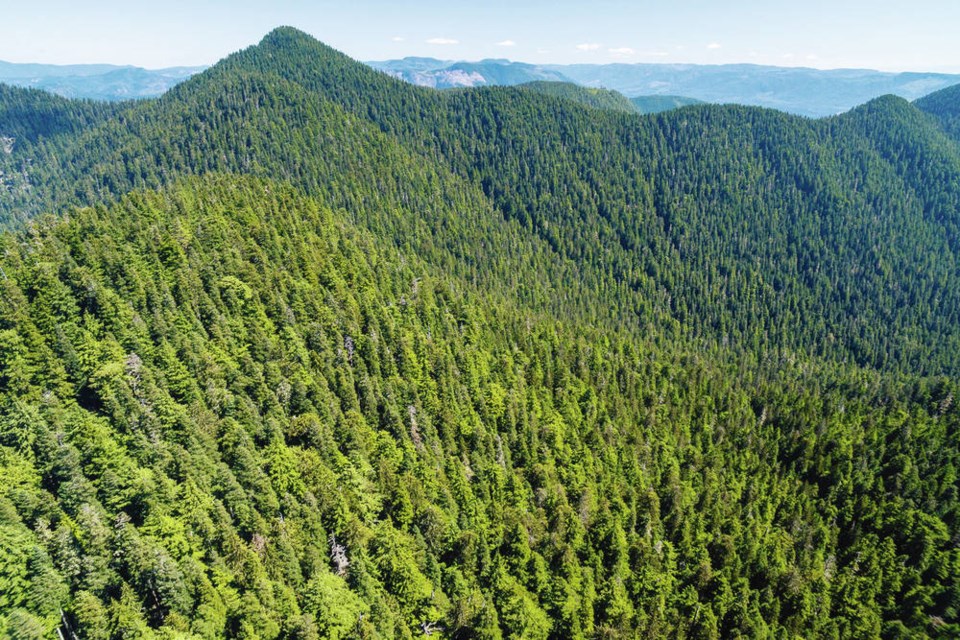Environmental groups and activists are unsure how much old-growth forest could be protected after three First Nations officially notified the province Saturday that they want to defer old-growth logging for two years in the Fairy Creek and Central Walbran areas while they prepare stewardship plans.
A joint statement by the Ditidaht, Huu-ay-aht, and Pacheedaht First Nations does not address the scope of the potential deferral areas, leaving with questions about what the notice means for the months-long protest to protect ancient trees in a vast area of southwestern Vancouver Island.
Jeff Jones, chief councillor of the Pacheedaht First Nation, said the nations are not releasing specific information on the requested deferral areas until the province responds to their notice.
Jones said the nations have had enough of outside visitors trying to direct the “thoughts of the nation.”
“Forestry is a big part of our revenue every year, and we really look highly of getting that revenue every year to provide future employment opportunities for our people,” he said.
Protesters trying to prevent the falling of old-growth trees have been blockading logging roads near Port Renfrew and Lake Cowichan where the Teal-Jones Group has government approval to log. Much of the conflict is playing out on unceded Pacheedaht territory, with some of the protest occurring on traditional Ditidaht territory.
The Pacheedaht First Nation has an agreement with the province to receive a percentage of the stumpage revenue generated by timber cut on their territory.
Ditidaht elected Chief Brian Tate said the three nations have watched for more than 150 years while other people decided what was best for their lands, water and people.
“Our nations have been the last to benefit from what others take out of the territory, and we’re also the last to be asked what must be put back,” he said.
The joint statement asks protesters not to block logging approved by the nations and the province in other parts of their territories.
“Anyone who requests permission to enter our ḥahahuułi [traditional territories] is welcome provided they conduct themselves in accordance with our sacred principles. That includes safe, peaceful, and lawful protest that does not interfere with legally authorized forestry operations.”
The RCMP said in a statement that the injunction order “with police enforcement clause was granted by the B.C. Supreme Court to Teal-Cedar Products Ltd. on April 1, 2021 and lasts until midnight on September 26, 2021. The order is a mandatory direction from the court to the police and so the RCMP is still required to enforce the order.”
On Monday, 13 people were arrested, RCMP said. Since enforcement of the injunction began, 185 arrests have been made, including nine repeat arrests.
The Teal-Jones Group said it will follow the notice from the three nations.
“We will abide by the declaration issued today, and look forward to engaging with the Pacheedaht, Ditidaht, and Huu-ay-aht First Nations as they develop Integrated Resource Forest Stewardship Plans,” the company said in a statement.
The company did not make someone available for an interview Monday.
The deferral notice requires approval from the B.C. government.
Premier John Horgan issued a statement saying the province is “pleased to enter into respectful discussions with the Nations regarding their request. We understand the request must be addressed expeditiously, and we will ensure a prompt response.”
During a media scrum, Katrine Conroy, minister of Forests, Lands, Natural Resource Operations and Rural Development, avoided defining the area in question, and told reporters the province is not required to provide compensation to Teal-Jones for a deferral of up to four years.
The Rainforest Flying Squad, the group protesting logging in the area, called the deferrals “a very small victory.”
They said deferrals must include the entire 2,080-hectare Fairy Creek Rainforest, not just the watershed, as well as other areas known as Caycuse, Camper Creek, Upper Walbran, Bugaboo Creek, Granite Creek, 2000 Road and Edinburgh Mountain.
“Until these things happen, at the invitation of Elder Bill Jones, the Rainforest Flying Squad will continue to stand our ground and defend our last ancient forests,” the group said in a statement.
Torrance Coste, national campaign director for the Wilderness Committee, said it’s good news when First Nations assert control over their own territories, and when any old-growth logging is deferred, but more detail is needed. “We don’t have maps, so all we can do is guess.”
The nations said there will be no new road building into the Fairy Creek watershed — the catalyst for initial blockades in August — effective immediately, as well as no harvesting in the watershed. Some maintenance or deactivation may occur for safety and environmental purposes.
Continuing to build the road would have compromised the future protection of the watershed, creating access and a financial incentive for Teal-Jones to apply for logging permits within the watershed, Coste said.
regan-elliott@timescolonist.com



